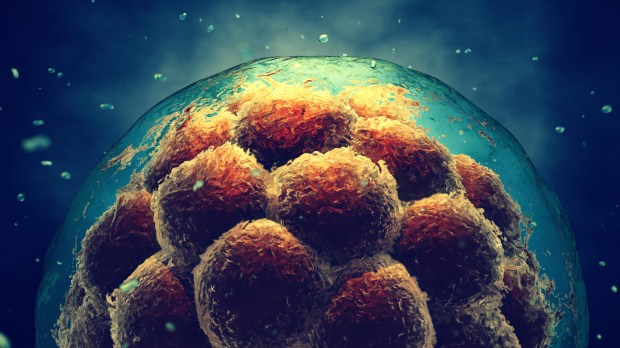An international scientific standard that prohibited laboratories from culturing human embryos in research past 13 days has been relaxed. The International Society for Stem Cell Research (ISSCR) has abandoned the so-called 14-day rule, placing no time limit on culturing the embryos.
The rule was once thought to be a reassurance to the public that scientists would not end up cloning human beings.
In a May 26 announcement, the ISSCR in effect conceded to pressure that has been building for several years, after some scientists demonstrated that human embryos can in fact be grown in vitro past the two-week point.
“Rather than replace or extend the limit, the ISSCR now suggests that studies proposing to grow human embryos beyond the two-week mark be considered on a case-by-case basis, and be subjected to several phases of review to determine at what point the experiments must be stopped,” the journal Nature reported.
At least a dozen countries, including the United Kingdom, Canada and South Korea, adopted the 14-day rule, first proposed in 1979, as law.
While he regretted the relaxation of the rule, Fr. Tadeusz Pacholczyk, Director of Education for the National Catholic Bioethics Center, said there is no essential difference in whether lab experiments are permitted on human beings at any stage.
“Researchers had been feigning for a long time that the 14-day rule was somehow an ethical tenet grounded in biological facts — while in reality it was a ceremonial ‘line in the sand’ used to provide ethical cover for scientists, even as they engaged in basic human rights violations in their laboratories under the pretext of these ‘regulatory limitations,’” Fr. Pacholczyk told Aleteia.
John B. Appleby and Annelien L. Bredenoord, writing at the website of the National Center for Biotechnology Information, a branch of the National Institutes of Health, explained that the 15th day of embryo development “is the point when the primitive streak forms: that is, the beginning of gastrulation when three layers of germ cells differentiate. The 14th day is therefore notable, because the embryo is then individuated and can no longer become a twin. Consequently, the 14th day has, until recently, represented a natural and convenient biological turning point at which to restrict any further research on embryos.”
Embryos’ value
But Fr. Pacholczyk charged that those who originally set up the 14-day rule “devised a stratagem to offer lip service to the moral status of the human embryo by suggesting that the formation of the rudiments of a nervous system at around two weeks of age suddenly conferred ‘value’ on embryos.”
“Their mistake, of course, was failing to see, or looking past the fact, that it is only because embryos are human already that they are able to develop a nervous system in the first place,” said the priest, who has a doctorate in neuroscience from Yale University. “We are not valuable because we have a nervous system; we are valuable because we are already the kind of being, a human being, that is capable of developing a nervous system if we have not yet not done so. The 14-day rule reveals a way of thinking that allows for wrongful age discrimination or bias against younger human beings, with a justification based on what are ultimately secondary considerations.”
The new policy comes five years after research teams announced that they had been able to grow human embryos in a petri dish for up to 13 days, but then terminated the experiments in accordance with the 14-day rule. Presumably, they could have kept the embryos alive longer.
“Such advances have led some ethicists and researchers to argue that the decades-old rule is antiquated and ripe for revision,” said Nature. “Allowing embryos to grow past 14 days, researchers say, could produce a better understanding of human development, and enable scientists to learn why some pregnancies fail, for instance.”
The journal said that over the past decade, scientists have made “increasingly sophisticated models of embryos from human stem cells, demonstrating one way to study human development while avoiding the controversial use of embryos from fertility clinics. Such embryo-like structures are too rudimentary to grow into a person, scientists say.”
But Robin Lovell-Badge, a stem-cell biologist at the Francis Crick Institute in London and chairman of the ISSCR steering committee that wrote the new guidelines, said that relaxing the 14-day rule will allow researchers to compare these creations with real human embryos “and test them as feasible stand-ins for research,” according to Nature.
Fourteen days of development is the point at which the embryo “starts to form a body plan, deciding where its head will end up, and when cells begin taking on specialized missions,” according to Antonio Regalado, writing in the MIT Technology Review, where he is senior editor for biomedicine.
He explained why being able to go beyond the 14-day limit is important to some scientists. They “believe the long-term growth of normal embryos, or embryo models, would create a platform to explore the genetic engineering of humans,” Regalado wrote. “More fully developed embryos could be used to study the consequences of gene editing and other types of modification. That is, if genetically modified humans are to be created in the future, the modifications should first be tested for safety on lab embryos.”
Black box
Appleby and Bredenoord, in the National Center for Biotechnology Information article, noted that the period between the 14th and 28th day of embryo development is sometimes referred to as the “black box” of human development.
“To date, it has been — from a scientific or regulatory point of view — very challenging to study and gain knowledge about how embryos develop during this period,” they said.
Extending the window for embryo research to 28 days would allow scientists to study the developmental processes during gastrulation when the first primitive tissues form. They could learn more about the developing nervous system without any risk of neural connections being present and gain a better understanding of the early development of organs. It would also be possible to advance our knowledge about cell fate decisions during early embryonic development. Moreover, an extended research window could further improve the safety and success rate of current IVF procedures. For example, this could potentially help scientists understand the nature of some birth defects and also help clinicians predict which IVF embryos are likely to result in a successful pregnancy. Scientists could also learn more about the physiology of pregnancy beyond the 14th day, including the processes surrounding implantation and why medical events such as miscarriages happen.
But some are hesitant, fearing a backlash, Regalado noted. According to Tetsuya Ishii, a bioethics and legal researcher at Hokkaido University, he wrote, “new experiments ‘might ignite abortion debates,’ especially if the researchers develop human embryos to the point where they take on recognizable characteristics like a head, beating heart cells, or the beginning of limbs.”
“Are there interesting scientific discoveries that could be made by studying human embryos who are older than 14 days? Of course there are,” conceded Fr. Pacholczyk, “even if most of that information could similarly be obtained by studying monkey or other primate embryos. Actually, there are significant scientific discoveries that could be made by experimenting on humans who are even older, say 14 weeks, or 14 months of age. The 14-day rule for embryos objectively demonstrates no more respect for human embryos than would a declaration by ISSCR that researchers should now be permitted to experiment on newborns up to 14 months, as long as those newborns were summarily destroyed ahead of the deadline. Whether 14 days, 14 months, or anywhere in between, such ‘rules’ remain contrivances to justify the most unethical kinds of research and to allow for the exploitation of our own vulnerable human offspring.”
David Albert Jones, director of the Anscombe Bioethics Center in Great Britain agreed. “To experiment on human embryos that are up to 14 days old — extremely vulnerable human lives — is already a grave injustice and a form of exploitation,”Jones said in a statement. “Extending the 14-day rule would make more embryos vulnerable to exploitation and strip away one of the few remaining limits to injustices committed against embryonic human beings.”



